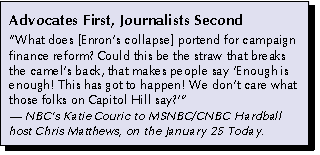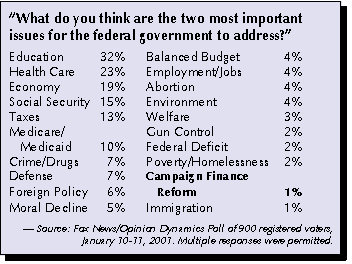 |
|||||||||
|
 |
||
|
 |
||||||||||||||||||||||||
|
||||||||||||||||||||||||
 |
||||||
|
||||||
 |
||||||
|
 |
||||||||||||||||||
|
||||||||||||||||||
 |
||||||||||||||||||||||||
|
||||||||||||||||||||||||
 |
||||||||||||||||||
|
||||||||||||||||||
|
|
|
For Immediate Release: Katie Wright (703) 683-5004 - Monday,
February 11, 2002

Establishment Journalists Discarded Objectivity for Activism In Pushing for Campaign Finance "Reform" Will Congress Reward Media's Advocacy?
In September 1997, the New Republic's Jonathan Chait wrote about attending "a briefing with campaign finance reform activists and journalists who cover the topic." He quickly found the reporters were not objective observers: "The journalists seemed just as outspoken for reform as the advocates," he noted. "The invisible line separating reporters from partisans melted away easily; aside from recognizable faces, I could not tell who was who." Being outed as activists hasn't halted journalists' not-so-veiled campaign for new regulations on candidates, office-holders, PACs, issue groups, citizens - in short, every part of the political system except the media themselves. The latest push to change the rules came after energy giant Enron's bankruptcy, a financial collapse which cost thousands of employees their jobs and gutted the retirement savings of tens of thousands more. Taking advantage of the story's complexities, reporters implied that officials who took legal donations linked with the unpopular corporation were themselves guilty of some unspecified wrongdoing. "As Congress rails against Enron, many of them took campaign contributions from the company - its political action committee and/or its employees," Tom Brokaw impugned on the January 24 NBC Nightly News. "On the House side, 187 members, almost half, have taken more than $603,000 from Enron since 1989....Spurred on by the Enron scandal, supporters of campaign finance reform legislation in the House gathered enough signatures today to force a vote on the issue." Of course, those dollars that Brokaw made seem so dirty wouldn't have been outlawed under either the House or Senate's version of reform, as accurately pointed out in a January 30 report from the leftist U.S. Public Interest Research Groups, who want an even more radical federal takeover of campaign funding. But the point seems to be to shame politicians into passing a bill favored by reporters, as Dan Rather's biased presentation on the January 24 CBS Evening News made clear: "CBS gives you an in-depth look at the sudden revival of congressional interest in legislation that's been killed more times than Dracula: legislation for serious campaign finance reform. In the wake of the Enron fiasco, will Congress finally put its votes where its mouth is?" he demanded. This week's House vote could wind up rewarding the liberal media for their years of advocacy journalism. Here's how reporters have spun the campaign finance story: -- Blame the system. Focusing on violations of existing campaign law would imply the need for stricter oversight and enforcement, not aggressive new laws. So when Congress began its hearings into Clinton-Gore's 1996 wrongdoing, reporters insisted on changing the subject. "What's really in the dock beginning today isn't any politician but the system that politicians built," contended David Shribman in a Boston Globe news analysis on July 8, 1997, the first day of hearings. "What's important...isn't what one party can show about the other, but what the campaign-finance system shows about our political system." By the time those hearings into the Democrats' campaign shenanigans were over, conservatives who disagreed with the media's dreams for reform were the bad guys. "In the full Senate today, campaign reform never had a chance," Peter Jennings mourned on the October 7, 1997 World News Tonight. "Reformers have been trying to change the system that many people think has caused so many of the fundraising problems...but the McCain-Feingold bill, as it's called - one Republican, one Democrat - went down to defeat today." A law-breaking party that gave lip service to reform got better press than the law-abiding party that refused to get in line. (Remember, "soft money" is 100% legal.) "For all the headline-grabbing excesses of the Clinton-Gore campaign, the Republican Party won the soft-money race hands down" in 1996, scolded Ken Bode on the October 24, 1997 edition of PBS's Washington Week. "Republicans have raised and spent more soft money than the Democrats in every single presidential campaign, and they remain the most vocal opponents of campaign finance reform." -- Support reform's friends. When Wisconsin's liberal Democratic Senator Russ Feingold (of McCain-Feingold fame) found himself in a close re-election race in 1998, journalists worried that reform would be hurt if the reformer lost to a free-spending negative campaigner. A Feingold loss, ABC's Dean Reynolds ominously warned on the October 22, 1998 World News Tonight, "would say a lot about the way campaigns are run and whether fighting to change that way is political death." Feingold won. McCain himself reaped even better press a year later as he tried to leverage the media's pro-reform bias into a successful White House bid. Sounding every bit the activist, ABC's Diane Sawyer applauded McCain on the September 27, 1999 Good Morning America: "However brave a stand campaign finance reform may be, members of your own party have rejected it. What's the matter with them? Why don't they get it?" ABC's morning news show rewarded candidate McCain with more free TV time than all of his rivals for the GOP's 2000 nomination combined. -- Demonize reform's foes. Kentucky Republican Mitch McConnell, a Senator who opposed McCain-Feingold, was denigrated by Brokaw on the September 26, 1997 Nightly News as "a one-man wrecking crew when it comes to campaign finance reform." On CNN's Capital Gang on November 28, 1998, the Wall Street Journal's Al Hunt argued that the Republican Senator's opposition to the bill was itself unethical: "McConnell, every bit as much as the Clinton campaign in 1996, personifies the addiction to sleazy big money." Whenever Congress "failed" to pass the legislation that journalists favored, reporters used their perch to chastise their opponents. "Republicans kill the bill to clean up sleazy political fundraising. The business of dirty campaign money will stay business as usual," decried Dan Rather on the February 26, 1998 CBS Evening News. "Legislation to reform shady big-money campaign fundraising is dead in Congress." -- Campaign money = corruption. "No presidential candidate ever raised more money from business than George W. Bush. For corporate America those investments may be paying off," CBS Evening News reporter Anthony Mason charged on March 19, 2001, citing presidential backing of Alaskan oil drilling and Bush's statement that he would try to prevent a disruptive airline strike. Both are policies that most conservatives would support, but CBS preferred to portray the President as in a corrupt bargain with campaign donors. The networks have also used Enron's donations as a club to win their version of reform. On February 1, 2002, NBC's Jim Avila challenged Vice President Cheney's integrity: "Ken Lay, long-time friend to the first President Bush, and together with Enron, the single largest political contributor to the second, donating nearly $800,000 over the last seven years to George W.'s campaigns and inauguration. Critics charge that investment bought Enron access and say this memo...is exhibit A." The Enron memo, addressed to Cheney, argued for the administration to reject wholesale price caps on California electricity during last year's blackouts, a position Cheney already espoused. --
Ignore the other side. Principled opponents warn the new rules would
wrongly limit constitutionally-protected political speech, that previous reform attempts created "loopholes" such as soft money that are now decried, and that most reform proposals tilt in favor of big labor-backed Democrats. But apart from interviews with opponents such as McConnell, these arguments have generally been buried, even as reporters branded anti-free speech ideas with the "reform" label. Over the years, the public has not been convinced that new campaign rules were a major priority (see box), but enough lawmakers - apparently tired of being portrayed as crooks for playing by the rules - seem ready to cave. If their brand of campaign reform becomes law, journalists who used their privileged perches to push a self-serving agenda will have won a major reward: a reform law that gives them even more clout over politics. And they'll doubtless call it a triumph for democracy. -- Rich Noyes
Home | News Division
| Bozell Columns | CyberAlerts |









